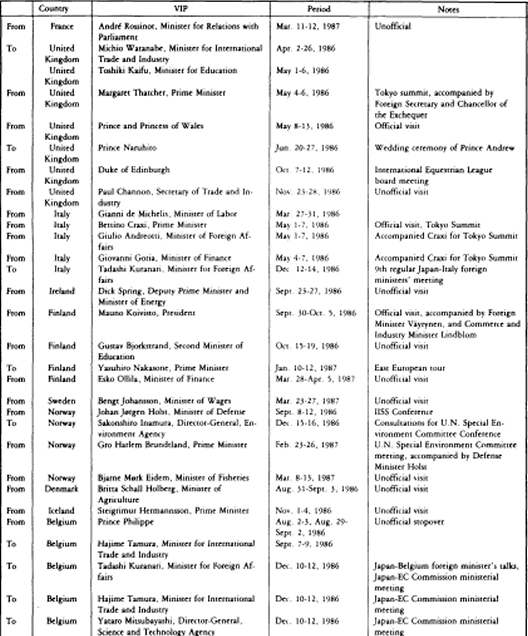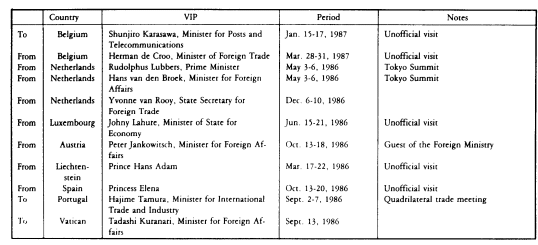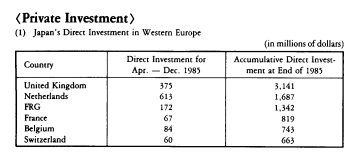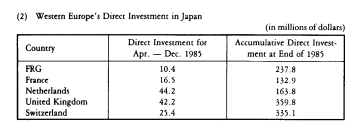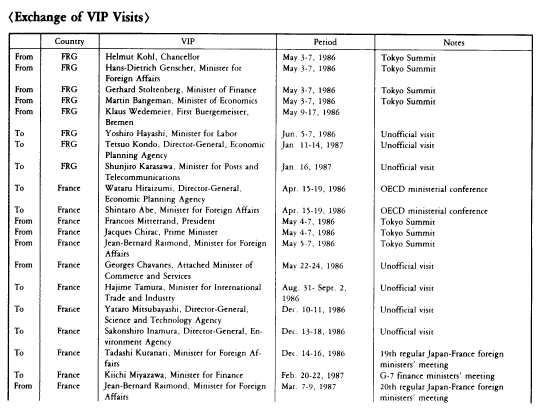
Section 5. Western Europe
(1) Overview
West European countries share basic values of freedom and democracy with Japan, the United States and other industrial democracies. All these industrial democracies have a common interest in maintaining and developing free trading and market economy systems. Western Europe bas growing hopes on Japan's contributions to world peace and prosperity at a time when the world is faced with difficult East-West political and international economic problems. In the circumstances, cooperative relations, especially political ties, have been getting closer between Japan and Western Europe over the past years.
Japan and Western Europe have increasingly promoted their personnel exchange. In 1986, top leaders of France, the Federal Republic of Germany, Italy, UK, the Netherlands and the European Community Commission attended the Tokyo economic summit. Finnish President Mauno Kovisto paid a state visit, and Italian Prime Minister Bettino Craxi and UK's Prince and Princess of Vales paid official visits respectively. Many other leaders of West European nations visited Japan in the year. On the other hand, Japan's then Foreign Minister Abe attended a ministerial conference of the Organization for Economic Cooperation and Development in Paris in May 1986 and held talks with French leaders. In December, Foreign Minister Kuranari attended a Japan-EC Commission ministerial conference and toured Belgium, Italy, Vatican City and France. In January 1987, Prime Minister Nakasone made a trip to Finland. Regular foreign ministers' consultations between Japan and Western European countries included two rounds of talks with France and Italy respectively between May 1986 and March 1987. Foreign ministers' talks also took place between Japan and the EC chairing country in April and September 1986. Other meetings included consultations between Foreign Minister Kuranari and Lord Carrington, secretary-general of the North Atlantic Treaty Organization in December 1986. Japanese government leaders also held talks with West European leaders on the occasions of international conferences to expand Japan-Europe dialogue.
(2) Economic Relations
Economic relations between Japan and Western European countries remained tense through 1986 as they were in the previous year. The EC's Foreign Affairs Council in March 1986 confirmed its hardline policy against Japan. The EC's concerns over economic relations with Japan grew more serious as it became clear that its trade deficit with Japan was further increasing, with Japanese exports to EC countries growing fast. The serious concerns were expressed again in the presidency conclusions of the Foreign Affairs Council in July. The EC requested that Japan eliminate trade barriers for alcoholic beverages, threatening to file a complaint against Japan's systems under GATT Article 23. The EC, at its Foreign Affairs Council in October, decided to take procedures on this matter under GATT Article 23-(2). The Japanese government, for its part, decided a plan for tax reform on December 23, including elimination of grading system for whisky, abolition of ad valorem tax on wine and substantial reduction of liquor tax rates. This decision was appreciated by countries involved, but some countries were still dissatisfied with it. Finally, this issue was subjected to GATT consultations by EC.
At a GATT ministerial meeting held in Uruguay in September 1986, the EC came up with an argument for "Balance of Benefit" and seemed determined to demand a thorough investigation of the "Japan Problem," demonstrating anew its hardline attitude against Japan. In rebuttal, Japan warned that the EC's argument could lead to a controlled trading system which runs counter to the free multilateral trading system as the goal of GATT.
Under these circumstances, Japan-EC Ministerial Meeting took place in Brussels in December. The Japanese side, represented by Foreign Minister Tadashi Kuranari, International Trade and Industry Minister Hajime Tamura and Science and Technology Agency Director-General (Minister of State) Yataro Mitsubayashi, put forward some positive measures including the start of negotiations on a nuclear fusion research cooperation agreement and the establishment of an industrial cooperation center, bringing about an atmosphere conducive to the furtherance of positive cooperation. Some specific pending issues were solved at the meeting to achieve progress in Japan-EC bilateral relations.
On the other hand, the EC's trade deficit with Japan totaled $16.7 billion in 1986, up about 45% over the previous year, and the EC feared that Japan's exports to the United States could be diversed to Europe due to the Japanese yen's appreciation against the U.S. dollar. The EC Foreign Affairs Council at its meeting on March 16, 1987, expressed its concern about this situation. In response to this, Japan emphasized its efforts to bring the balance to Japan-EC trade through expansion of bilateral trade and regretted that the EC again brought up the "Balance of Benefit" and import target which had already been fully discussed. Japan called on the EC to take appropriate actions on the serious problems specified by Japan such as discriminatory quantitative restrictions on Japanese products.
On the other hand, Western European countries will remain dissatisfied with Japan, if its huge trade surplus continues. In this sense, economic relations between Japan and Western European countries in 1987 seems still tense.

